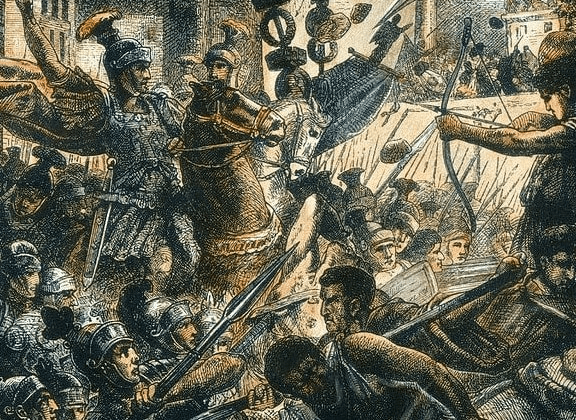There are three characteristics that most leaders have in common: pride, self-interest, and the ability to intimidate people. Many dictators are not born into a position of power. Instead, they often begin their ascent to sovereignty by climbing a ladder of power. Sulla, the first self-appointed Roman Dictator in Roman history, is a prime example of a man who was driven by a desire for power—he was willing to do anything to get to the top. Although Sulla originated from a minor Patrician family, he nevertheless knew that there was only one way to live comfortably in Roman life: through the acquisition of power.1 His talent as a military commander earned him fame and political power. With the assistance of more powerful mentors, the young soldier was given a wealth of advantages which he would use to propel himself through various political offices. Nothing could stop him from taking control of Rome, doing battle with a tyrant, and exterminating those who opposed him in order to carve his name into history.
Sulla Felix, or Sulla the Fortunate, as he referred to himself, began to climb the political ranks of the Cursus Honorum, or “Run of Offices,” as a Queastor, an administrator at the lowest level, in 107 BCE under the command of Gaius Marius. Marius had previously been Consul, the highest ranking magistrate in the Roman Republic, and was well-known for his role in the on-going Jugurthine War of 112 BCE. By the end of the war in 106 BCE, Sulla had earned respect from Marius, and his name was consequently spread throughout Rome. His newfound popularity earned him the valuable praise of the general populace, which allowed him to be elected to office again. However, this time he enjoyed the title of Praetor and was was able to lead a small army, which he used to ultimately become a high ranked officer, one with access to greater power, and a larger army. After returning to Rome, he was appointed governor or Cilicia. Later, he was the primary Roman commander during the Social War (91 BCE to 88 BCE), which began when other Italian cities wanted Roman Citizenship but were not given them. Amid the chaos, Sulla fought alongside Marius once more, further proving himself to be capable of leading an army on his own.2 After several years of battle, when the Romans extended citizenship to those who no longer fought against them, Sulla became a war hero.

Soon after he became a well-known war hero, he was elected Consul in the year 88 BCE. He hardly had time to settle into his office before Mithridates, the King of the Pontus, a region in Northeastern Asia Minor, or modern-day Turkey, began slaying Roman citizens in retaliation for Roman Expansion. When word of this slaughter reached Rome, the Senate ordered Sulla to lead an army against Mithridates.3 On his way to fight with Mithridates, Sulla got word that Marius and Rufus (another former general) had gone to meet with the Senate and objected that Marius should have commanded this army instead of Sulla. This angered Sulla, which made him turn his army around and march on Rome. Sulla attacked Marius, who escaped Sulla by leaving Rome for Africa.4 Rufus, however, was not so lucky and was killed by Sulla for deserting him. Sulla then returned to the task of fighting Mithridates for the murder of innocent Romans. When the smoke cleared, Sulla left Asia Minor victorious and returned to Rome. Prior to his return, Sulla had learned that Marius had allied with Cinna, a former Consul, to take control of Rome. The two had killed anyone who opposed them and had seized power in Rome as Consuls.5 As fate would have it, however, Marius would never have an opportunity to meet his peer on the battlefield. Instead, Marius died of old age before Sulla arrived in Italy, and Cinna was killed by his army shortly thereafter, prompting the election of new Consuls. Upon Sulla’s return in 82 BE, he was met in battle by Norbanus and Scipio Asiaticus, the new Consuls of Rome who had just been elected. Sulla’s army beat Norbanus fairly easily because his army had much more combat experience. After he defeated Norbanus, Sulla convinced Asiaticus’s men to join his side.6 In a final attempt to beat Sulla, the Senate appointed two new Consuls, one of which was Marius’s son, Marius Minor. Marius Minor was immediately sent to stop Sulla’s second march on Rome. Marius eventually realized that victory was impossible, he attempted to flee Rome, was caught, and committed suicide.

When Sulla returned to Rome, he took control of the government by force and had the Senate give him the title of “Dictator for Life.”7 Thus began Sulla’s reign with his loyal army. Those who opposed him or were accused of opposition were put to death. Sulla issued his famous proscription, which was a document that called for the death of hundreds–and perhaps thousands–of people who had opposed Sulla or had simply said anything against him. The Proscription kept people from opposing him by striking fear into those who might try to overthrow him. After Sulla had created the Proscription, he also formed a judicial body that was in charge of the list in order to make sure those on the list were executed. At the end of the purge, there were so few Senators left that Sulla was forced to assist them in order to get them to complete their job, which resulted in a political standstill: there were no laws being made and no names being added to the list.8

Sulla also decided to reform the Senate and Court System, and passed a law requiring individuals to have had prior experience in the government in order to hold office. He then split up the work for the two systems so they would have the equal amount of work. He figured that this would prevent another political standstill and that it would allow both parties the ability to focus on more cases. Sulla also ensured that nobody would be able to rise to power in the way that he did by reforming the Constitution to everyone that had wanted to become a Consul, Praetor, or higher had to serve in Rome. Once he had been in office for about two years, Sulla retired from being dictator, and was elected Consul for 80 BCE, for a final term. Sulla retired from politics after this consulship and lived the rest of his life out in Italy where he died in 78 BCE.9
- Badian, E. “Waiting for Sulla.” The Journal of Roman Studies 52 (1962): 47-61. doi:10.2307/297876, 49. ↵
- Frier, Bruce W. “Sulla’s Propaganda: The Collapse of the Cinnan Republic.” The American Journal of Philology 92, no. 4 (1971): 585-604. doi:10.2307/292665, 602. ↵
- Sherwin-White, A. N. “Ariobarzanes, Mithridates, and Sulla.” The Classical Quarterly 27, no. 1 (1977): 173-83. Http://www.jstor.org.blume.stmarytx.edu:2048/stable/638378, 173. ↵
- Badian, E. “Waiting for Sulla.” The Journal of Roman Studies 52 (1962): 47-61. doi:10.2307/297876, 57 ↵
- 2. Frier, Bruce W. “Sulla’s Propaganda: The Collapse of the Cinnan Republic.” The American Journal of Philology 92, no. 4 (1971): 585-604. doi:10.2307/292665, 558. ↵
- Badian, E. “Waiting for Sulla.” The Journal of Roman Studies 52 (1962): 47-61. doi:10.2307/297876, 60. ↵
- Badian, E. “Waiting for Sulla.” The Journal of Roman Studies 52 (1962): 47-61. doi:10.2307/297876, 60. ↵
- P. V. D. Balsdon. “Sulla Felix.” The Journal of Roman Studies 41 (1951): 1-10. http://www.jstor.org.blume.stmarytx.edu:2048/stable/298093, 4. ↵
- Badian, E. “Waiting for Sulla.” The Journal of Roman Studies 52 (1962): 47-61. doi:10.2307/297876, 61. ↵



11 comments
Christian Anthony
I never knew of Sulla before reading this article but already I find his character very interesting. The ways he was able to control those who opposed him and take power makes me think that he must of been very strong willed. Unlike Ceaser Sulla was able to use brutal force to achieve power such a distinct difference makes me wonder why I have not heard of Sulla. But nonetheless a very interesting article.
Reagan Clark
Interesting article. I have never heard about Sulla before, only the major Emperors of Rome. I like how this article showed Sulla’s rise in power by climbing through the ranks. He started out in a lowly position and earned his way to eventually be the Dictator of Rome. His story is interesting though. He opposed Marius and his rule over Rome with Cinna. Marius killed anyone who opposed him. I would have thought that Sulla would have been different and yet when he managed to seize power, he did the exact same thing. At least Sulla made it impossible for someone else to do what he did. I would not really consider him a dictator though as he only served for two years and helped develop a future political system without dictators.
Margaret Cavazos
This article was an interesting read, and I enjoyed reading it. I find it scary how Sulla could rise so quickly and command such power that he turned his army around to defeat people who turned their back on him, went back to his mission, and then came back to seize power. I thought it was equally interesting that he set rules against rising to power the way he did and then peacefully stepping down from his position of power.
Anthony Coronado
I am a lover of mythology stories. This article was a very informative article with the concept of the form of the strong Roman Empire government that lasted centuries. Such as the ideas of the beginning of a modern republic, that many successful countries used this system to govern. As well as the events of Shakespeare of Julius Ceaser, notable people were mentioned in the article.
Raul Colunga
After reading the article, my takeaway is that Sulla quite the scary man. He had known and fought alongside Marius but when he complained that he was not leading the army in Asia Minor, Sulla turned his whole army back to kill him. But he was also smart and created many reforms that benefited the government like needing experience to hold a position in office.
Luis Jaen
Sulla was as prime, and early, example of a ruthless dictatorship. With his totalitarian views he was able to use brute force as a means to take over every territory he went through. With this brute force he was not only able to take of Rome, but also establish his own government for it. He even set up a list with a numerous amount of people who were ordered to be killed. With all this in effect, it is crazy to think that someone has that much power, not only brute force, but also influential power, that relating to those he was leading.
Andrea Degollado
This article was interesting to read. I think its quite amazing of how Sulla was able to take power and this article actually highlights how he did that. It was also interesting to read how he changed the government, such as having officials that had prior knowledge in government be the ones in office and how he appointment himself dictator for life. However it was ironic that after two years he retired from that position and later on retired to live out the rest of his life in Italy.
Sara Guerrero
I have only heard of Julius Cesar, but I never knew about Sulla and that he was the first self-appointed dictator. It must’ve taken a lot of gut for him to give himself that title and stick with it till the end of his life. He’s not like the other dictators like the more modern one and recent ones. He was seen as a hero and he was very powerful and powerful enough to take control of the government and knew how to work it.
Davis Nickle
Sulla is a fantastic example of how ruthless Roman politics could be at times. From the total destruction of his enemies to his gaining total control of the republic really accentuates how power was gained at the time. I found it very interesting that Sulla turned his army around just to punish a slight against his honor and the to go back to what he was doing as if nothing happened. It really is an incredible story.
Leopoldo Martinez-Milland
The story of Sulla is incredible to me as he seems to be one of the only Roman Emperors to get their power through sheer force and not get murdered for the controversy during the journey to the throne. The fact that he made himself “Dictator for life” and made a public list of people he was going to kill due to them simply disagreeing with him and getting away with it, is very ludicrous to me, especially knowing how dangerous the politics were in Rome at the time. Essentially, the unpredictability of Sulla made the citizens of Rome scared of him and scared to die at his hands as well. In a sense, you could say that the modern term for “dictator” comes from the havoc and deaths that came from the hands of Sulla. Either way, D’Hannah Duran did a great job showing the reader the power that fear gives to a society.